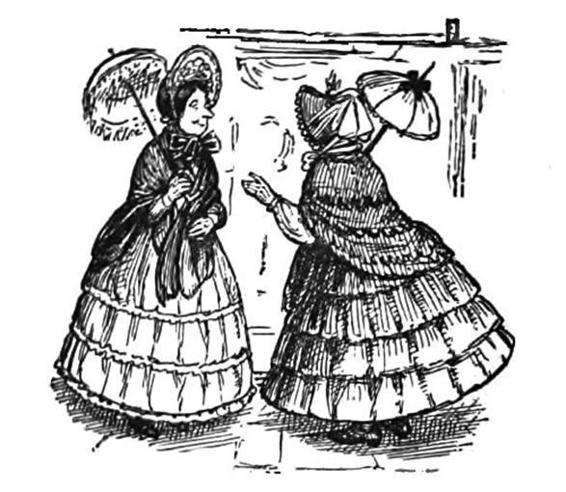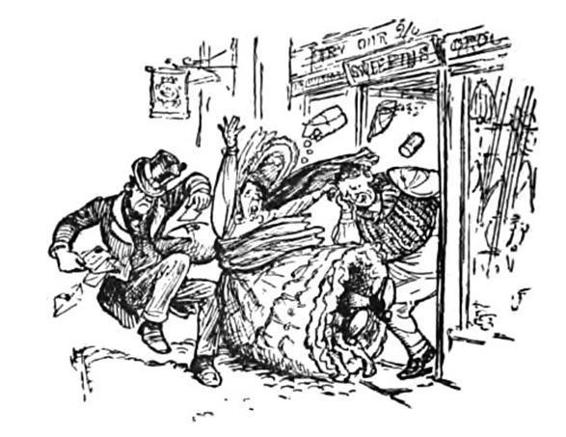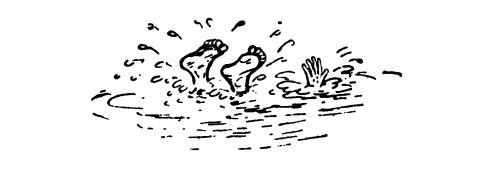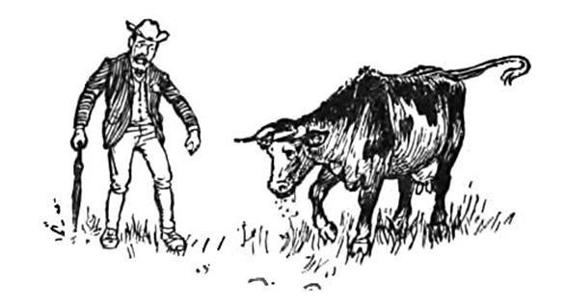Delphi Complete Works of Jerome K. Jerome (Illustrated) (Series Four) (390 page)
Read Delphi Complete Works of Jerome K. Jerome (Illustrated) (Series Four) Online
Authors: Jerome K. Jerome


“Why don’t you call your dog off, you wicked old man?”
“Because I can’t recollect his name, you old fool, you!”
Fond parent accuses uncle of having set dog on children — uncle, indignant, reviles fond parent — exasperated fond parent attacks uncle — uncle retaliates with umbrella — faithful dog comes to assistance of uncle, and inflicts great injury on fond parent — arrival of police — dog attacks police — uncle and fond parent both taken into custody — uncle fined five pounds and costs for keeping a ferocious dog at large — uncle fined five pounds and costs for assault on fond parent — uncle fined five pounds and cost for assault on police!
My uncle gave the dog away soon after that. He did not waste him. He gave him as a wedding-present to a near relation.
But the saddest story I ever heard in connection with a bull-dog, was one told by my aunt herself.
Now you can rely upon this story, because it is not one of mine, it is one of my aunt’s, and she would scorn to tell a lie. This is a story you could tell to the heathen, and feel that you were teaching them the truth and doing them good. They give this story out at all the Sunday-schools in our part of the country, and draw moral lessons from it. It is a story that a little child can believe.
It happened in the old crinoline days. My aunt, who was then living in a country-town, had gone out shopping one morning, and was standing in the High Street, talking to a lady friend, a Mrs. Gumworthy, the doctor’s wife. She (my aunt) had on a new crinoline that morning, in which, to use her own expression, she rather fancied herself. It was a tremendously big one, as stiff as a wire-fence; and it “set” beautifully.

They were standing in front of Jenkins’, the draper’s; and my aunt thinks that it — the crinoline — must have got caught up in something, and an opening thus left between it and the ground. However this may be, certain it is that an absurdly large and powerful bull-dog, who was fooling round about there at the time, managed, somehow or other, to squirm in under my aunt’s crinoline, and effectually imprison himself beneath it.
Finding himself suddenly in a dark and gloomy chamber, the dog, naturally enough, got frightened, and made frantic rushes to get out. But whichever way he charged; there was the crinoline in front of him. As he flew, he, of course, carried it before him, and with the crinoline, of course, went my aunt.
But nobody knew the explanation. My aunt herself did not know what had happened. Nobody had seen the dog creep inside the crinoline. All that the people did see was a staid and eminently respectable middle-aged lady suddenly, and without any apparent reason, throw her umbrella down in the road, fly up the High Street at the rate of ten miles an hour, rush across it at the imminent risk of her life, dart down it again on the other side, rush sideways, like an excited crab, into a grocer’s shop, run three times round the shop, upsetting the whole stock-in-trade, come out of the shop backward and knock down a postman, dash into the roadway and spin round twice, hover for a moment, undecided, on the curb, and then away up the hill again, as if she had only just started, all the while screaming out at the top of her voice for somebody to stop her!

Of course, everybody thought she was mad. The people flew before her like chaff before the wind. In less than five seconds the High Street was a desert. The townsfolk scampered into their shops and houses and barricaded the doors. Brave men dashed out and caught up little children and bore them to places of safety amid cheers. Carts and carriages were abandoned, while the drivers climbed up lamp-posts!
What would have happened had the affair gone on much longer — whether my aunt would have been shot, or the fire-engine brought into requisition against her — it is impossible, having regard to the terrified state of the crowd, to say. Fortunately for her, she became exhausted. With one despairing shriek she gave way, and sat down on the dog; and peace reigned once again in that sweet rural town.
TEA-KETTLES
IT is asserted by scientific men that you can take a kettle full of boiling water off the fire, and, placing it on your outstretched hand, carry it round the room without suffering any hurt to yourself whatever, unless, of course, the thing upsets.
It is necessary, to be sure, that the water actually boils, as otherwise you will burn your hand; and it is also as well to look and see that there are no hot cinders clinging to the bottom of the kettle. These two rules observed, the exercise may be indulged in with much success.
The explanation of the seeming phenomenon is very simple. The heat from the fire passes
through
the kettle and
into
the water, and thus, as soon as the water boils, the kettle, as any one who has studied science and those sort of things will readily understand, becomes cool, and may be carried about in the way I have explained, instead of by the handle.
For myself, I generally adopt the handle method, notwithstanding, and take a towel to it. I did try the scientific way once, but I do not think the water could have been boiling; and that, as I have explained, is a very important point, because, except when the water is actually boiling, the kettle is hot, and you are apt to say: “Oh! damn!” and drop it, and the water splashes out all over the floor. And then all the folks you have invited into the kitchen to witness this triumph of science,
they
say “Oh! damn!” too, and skip about in a disorderly manner, and flick their feet in the air, and rush out into the passage, where they sit down on the cool oilcloth, and try to take off both boots at once.

I do not know how it is, but I have generally found a certain amount of variance between theory and practise. I remember they told me, when I was learning swimming, that if I lay flat on my back, with my arms extended, and kept perfectly still, I could not sink — not even if I wanted to. I don’t know why they should have thought that I wanted to; but they evidently considered that there was a chance of my trying to do so, and that it was only kind of them to advise me not to, as the effort could only result in disappointment and loss of time. I might, if I stopped there on the water long enough, die of starvation or old age; or I might, in the case of a fog coming on, be run down by a boat and killed that way; but sink and be drowned, they assured me, I could not be. For a man to sink when lying on his back on the water was an utter impossibility: they worked this out on a slate, and made it quite clear to me, so that I saw it for myself.
And day after day, I would go down to the sea and place myself on the water in that position in which, as I have explained, it was contrary to the laws of nature that I should sink, and invariably and promptly go straight down to the bottom, head foremost!

Then there is that theory of the power of the human eye, and how it will subdue cows and other wild beasts. I tried that once. I was crossing a field near a farm-house at which I was staying; and, just when I had nearly reached the middle, and was about three hundred yards from the handiest fence, I became aware of the fact that I was being regarded with quite an embarrassing amount of attention by an active and intelligent-iooking cow. I took it at first as a compliment, and thought that I had mashed the cow; but when she slewed her head round so as to bring the point of her left horn exactly opposite the pit of my stomach, and began to sling her tail round and round in a circle, and foam at the mouth, I concluded that there must be something more in her mind than a mere passing fancy!

And then it suddenly occurred to me that it was because of this very cow I had been warned not to go near this very field. The poor animal had lately suffered a severe mental strain, owing to having been deprived of her offspring, and had evidently determined to relieve her overburdened feelings on the very first living thing that came fooling around.
Well, there I was, and what was I to do? I paused for a moment, wondering. At first I thought I would lie down and pretend to be dead. I had read somewhere that if you lie down and pretend to be dead, the most savage animal will never touch you. I forget the reason why it will not; I rather think it is supposed to be because it is disappointed at not having had the fun of killing you itself. That makes it sulky, and it will have nothing to do with you. Or else its conscience is touched in some way, and the result of the deed it has been contemplating brought home to it; so that it goes away full of thankfulness at having been kept from a great crime, and determines to be a better beast for the future.